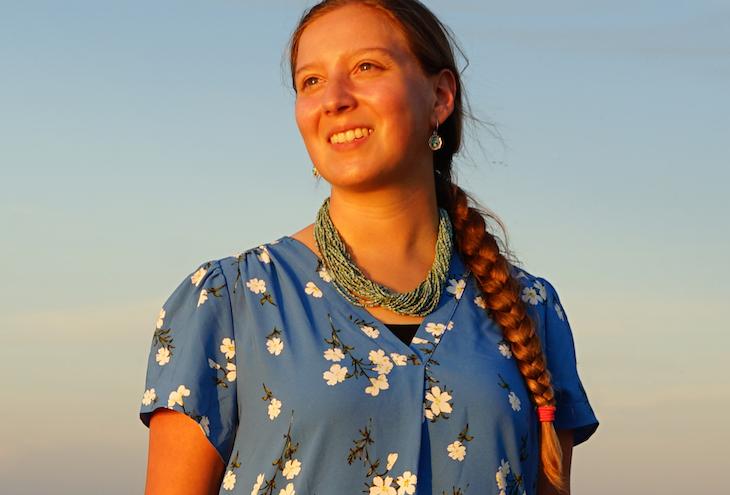When Angela Teeple was in middle school in Virginia, she enrolled in Project Lead the Way (PLTW) classes designed to get young people interested in STEM. In her class were Teeple’s best friend — a girl — and a roomful of boys.
Far from intimidating her, the fact that Teeple was one of two girls in the program motivated her to excel (something her teacher, a woman, encouraged). “I was competitive and always trying to be the best,” Teeple recalls. “I wanted to finish my work with 100 percent accuracy before the boys finished their projects. I wanted to prove my worth as a smart person.”
Teeple has more than proved her worth as an exceptionally smart and dedicated engineer in the years since her competitive spirit compelled her to outwork and outperform the boys in her middle school class. Today Teeple, who is from the Bay Mills Indian Community in Michigan, works as a nuclear engineer in the U.S. Air Force Nuclear Weapons Center. The winner of this year’s Most Promising Engineer or Scientist Award, Teeple has the sort of job that we should all be happy is occupied by someone as diligent, capable, and dedicated as she is.
Teeple is tasked with the technical analysis and modeling needed to assess the survivability of Air Force weapons systems and personnel against a wide variety of risks. “I am contacted by all parts of the Air Force that come to my team and ask for analysis of our systems if a certain scenario happens. It’s part of their mission planning,” Teeple says. “Our work is to use coding and nuclear engineering modeling to assess different scenarios.”
Teeple’s stellar performance merited the Air Force Materiel Command Junior Civilian Scientist and Engineer of the Year Award. She also received the Department of Defense Science, Mathematics, and Research for Transformation (SMART) scholarship, which will fund her PhD studies.
Even though Teeple excelled early as a middle school engineer, she went into high school thinking she would be an artist. But an introductory engineering design course changed that. Teeple’s teacher had her students do a project researching what different engineers do. Knowing that most students were going to delve into civil, electrical, and mechanical engineering, Teeple focused on the tasks of a nuclear engineer. “At that time, I was looking at the power industry and didn’t even know the weapons complex existed,” she recalls. “I thought nuclear engineering was cool and it’s clean energy, and at that moment, I decided I wanted to be a nuclear engineer.”
Teeple followed that path and received her BS in mechanical and nuclear engineering from Kansas State University in 2018. Last year, Teeple completed a master’s in legal studies focusing on Indigenous peoples’ law and policy from the University of Oklahoma. She has combined her technical expertise with her legal knowledge to help Native communities.
When Teeple was an undergrad, she undertook a project where she tested the water quality around campus, including for radiation. The samples were all clean, but Teeple decided to also test water around her community and came up with very different results. “Ours were dirty and had metals and elements that shouldn’t show up in water,” Teeple says.
She presented the results to tribal leaders and used her understanding of the law to find ways to address the water quality problem. Since then, Teeple, who funds her water-related work herself, has helped multiple tribes begin the process of obtaining necessary filtration systems and is working to pinpoint the source of the contaminants.
Despite having such a full schedule, Teeple still finds time to teach coding to Native students in the Albuquerque, N.M., area. She personally knows the importance of that early exposure to STEM. “I benefited from having a passion for STEM at an early age and want to give others the chance to find and pursue their own passion,” Teeple says.











